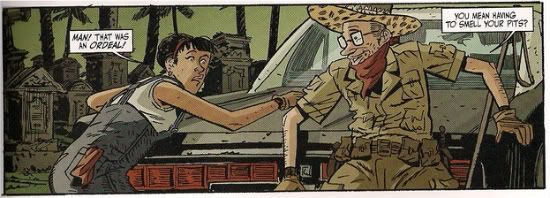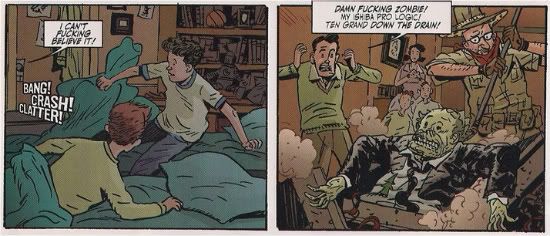Don't Worry, This Zombie Comic Had a Head Start on the Trend: Jog and a 2/18 comic from half a decade ago
/![]() The Zombies That Ate the World #1 (of 8)
The Zombies That Ate the World #1 (of 8)

All right! Early aughts nostalgia, coming in fierce! Some of us do still pine for those bygone days of Les Humanoïdes Associés publishing in English, even if our (by which I mean 'my') reading wasn't nearly as extensive as it should have been, and even after that ill-fated partnership with DC.
These days it's Devil's Due releasing the stuff, and they're keeping things pretty conservative - not only are they breaking albums up (and shrinking them down) into $3.50 pamphlets, but they're focusing keenly on material front-loaded with noteworthy North American talent. Indeed, for now (with this and the John Cassaday-drawn I Am Legion), they're devoting their energy to stuff DC started publishing but never got around to finishing. Still, I can't help but pray my dreams of an English-release of that last volume of The Metabarons might finally be coming true.
Until then, there's always stuff like The Zombies That Ate the World, which does boast the participation of Guy Davis, who's maybe head of the class among prolific, idiosyncratic cartoonists working in front-of-Previews genre comics today (John Romita, Jr.'s the only comparable talent I can think of offhand). The project started off as a one-shot deal for the 2002-04 revival of Metal Hurlant, but eventually expanded into four albums' worth of material (and a short animated film), released through 2008. I'm not sure if later volumes form book-length storylines, but this particular issue covers part of the first album, which collects a bunch of the Metal Hurlant stories; as a result, there's no pacing problems from the conversion to the pamphlet format.
Problems with the stories themselves are a different matter. The writer (and letterer) is Jerry Frissen -- also creator of the Image-released Lucha Libre series -- whose premise sees the walking dead more-or-less normalized into human society in the far future. Sure, the occasional bit of flesh still gets chewed, but zombies mostly just amble around looking rotten, powered by whatever instincts they'd developed prior to their deaths; they're perfect prey for the series' anti-hero zombie hunters, deluded nerd Karl and his oafish sister Maggie, who'll procure or dispose of any former human for any seemingly any damn reason, so long as they pay's good.
Social satire is the narrative result, in just about the most unsubtle manner possible - it'll come as no surprise that political correctness comes under fire ("life-impaired," ha!), or that consumerism is duly indicted. Hell, George A. Romero himself contributes a cover blurb! But Frissen's chief humans don't really struggle against anything, which admittedly is sort of the point - Karl and Maggie are just useful cogs in a capitalist machine that's inched ever closer to literal dehumanization by transforming ex-humans (parents, etc.) into burbling items that can be collected or tossed away for a fee.

Frissen underlines this point over and over again, then puts it in bold and repeats it often - see a middle-class fellow spewing quasi-liberal nonsense while obsessing over his zombie father-in-law breaking expensive stuff on the way to living creamtion! Look! Here's a rich guy with a thing for sex with undead models and actresses, women finally within his reach! It's simplistic, shallow stuff, although I'll give the writer a bit of credit for his willingness to let his protagonists be genuinely repulsive at times - Karl in particular has no qualms about diverting a freshly transformed woman to his own bedroom, and Frissen is rightly unsparing in showing the amoral state of his titular zombie/consumerism-eaten world. It's too bad that the scatalogical, infantile and very wooden conversations between Karl and Maggie lack the zest needed to add some real lived-in heft to his emphatic concept.
But that's where Davis comes in, to make it all OKAY. This comic is a classroom-ready example of how inspired visuals can enliven a so-so script, with Davis' impeccable character designs adding a sweetly vulnerable dimension to Frissen's unsparing world. Coupled with Charlie Kirchoff's colors -- warmer and earthier and than Dave Stewart's excellent work in B.P.R.D. -- Davis' drawings reveal a latent humanity to even the meanest human, and afford all those decomposed zombies a hapless air.
It's funny work, but there's pathos too, and it goes a ways toward counterbalancing the script's barking tone, investing it with more believability than such noise would otherwise elicit. It does make me want to see more of this stuff; I haven't read the later Metal Hurlant chapters since they first came out, so I don't recall if the writing settles in, but it certainly might. Good thing we'll get to see the whole span. Here's hoping this latest iteration of Les Humanoïdes in English gives more projects the time to show us how cross-cultural talents can (or cannot) gel.











